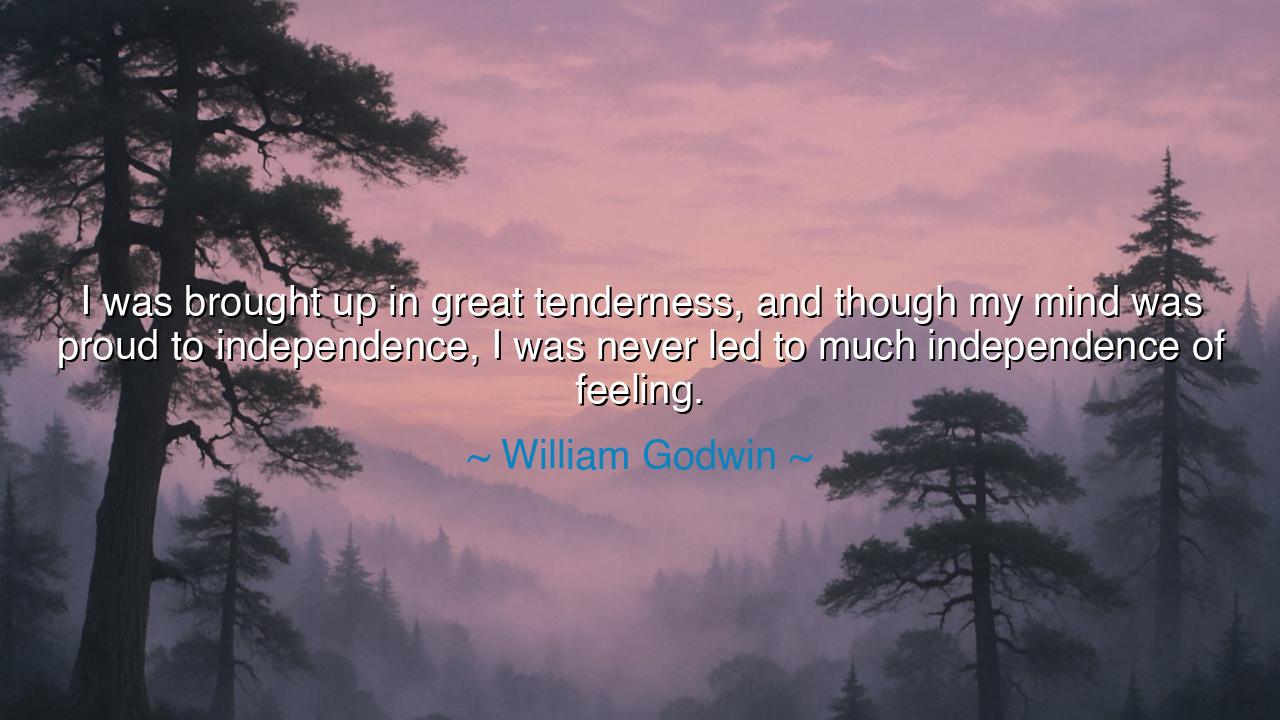
I was brought up in great tenderness, and though my mind was
I was brought up in great tenderness, and though my mind was proud to independence, I was never led to much independence of feeling.






Hear the voice of William Godwin, philosopher of the Enlightenment and father of ideas that would one day ignite revolutions of mind and heart. He said: “I was brought up in great tenderness, and though my mind was proud to independence, I was never led to much independence of feeling.” In this confession lies a profound truth about the human spirit — that one may be intellectually free and yet bound by the invisible cords of emotion, love, and tenderness. Godwin, the rationalist and reformer, understood that the chains of the heart are gentler but no less binding than those of iron. He speaks as one who has looked inward and found within himself a paradox: the freedom of thought standing beside the dependence of affection.
The ancients, too, knew this duality. The Stoics preached that the wise must be independent of the passions, that emotion clouds judgment and enslaves the will. Yet even the great Marcus Aurelius, emperor and philosopher, confessed in his journals that love — the tender pull toward family, the longing for understanding — was something he could neither deny nor master. In every age, thinkers have wrestled with this truth: that independence of mind is the triumph of reason, while independence of feeling is the struggle of the soul. Godwin’s words reveal the quiet battle between the intellect’s desire to stand alone and the heart’s need to belong.
He was born into a world of tenderness, nurtured by care, shielded from harshness. This upbringing, rich in affection, shaped his feelings into instruments of gentleness but perhaps weakened their strength for solitude. His mind, however, grew proud and unyielding — a fortress of logic, unafraid of kings or creeds. Yet even he, the apostle of reason, could not tear from himself the web of sentiment that binds every human being to others. Thus, his words are not of complaint, but of reflection — the recognition that love and independence often pull the heart in opposite directions, and that true wisdom lies in learning how to bear both.
Consider the tale of Mary Wollstonecraft, the woman he would one day love and wed — herself a pioneer of women’s rights and fierce independence of spirit. She, too, struggled between passion and principle, between the yearning to love and the need to remain free. When their souls met, it was as if the ideals of mind and heart had finally found each other. Their union, though brief, was the living embodiment of Godwin’s own philosophy transformed by tenderness. In her, he discovered that independence of feeling need not mean the absence of affection, but the mastery of it — the power to love without losing oneself.
There is in Godwin’s words an ancient melancholy, for they remind us that reason alone cannot fill the soul. A man may conquer the world of ideas, may stand unbent before authority and superstition, and yet find himself helpless before the glance of kindness or the sorrow of another. Independence of mind is a noble crown, but without compassion, it becomes a lonely diadem. To be fully human, one must hold both — to think freely, yet feel deeply. This balance is not weakness, but harmony.
The wise among us must therefore learn to govern the heart, not by extinguishing its fire, but by tending it with understanding. As the ancients said, “The mind is the charioteer, but the heart is the horse.” If the horse runs wild, we are lost; but if it stands still, we never move. Godwin’s confession teaches that even the proudest mind must make peace with the tenderness that dwells within it. To deny feeling is to deny humanity; to drown in it is to lose reason. The art of living lies in steering between the two.
So, my listener, take this teaching into your soul: nurture your independence of thought, for it will make you strong against falsehood and fear. But do not despise your dependence of feeling, for it is the source of compassion, connection, and joy. Let your intellect be a sword — sharp, discerning, unwavering — but let your heart be its scabbard, soft enough to contain it, gentle enough to preserve it. For in the marriage of these two — mind and emotion, reason and tenderness — lies the perfection of human nature.
And so, as the voice of Godwin fades into history, his message remains: true independence is not the absence of ties, but the wisdom to choose them well. Be proud in thought, yet humble in feeling. Let your reason lead you to truth, and let your heart remind you of mercy. In this balance, you shall find not only freedom — but peace.






AAdministratorAdministrator
Welcome, honored guests. Please leave a comment, we will respond soon